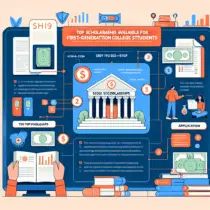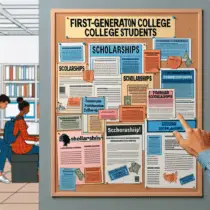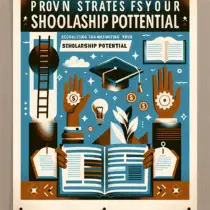Top Scholarships for First-Generation College Students and How to Apply
Higher education can be a transformative experience, opening doors to opportunities and careers that might have seemed unreachable. For first-generation college students—those whose parents did not complete a four-year college or university degree—the journey can be particularly daunting. One critical aspect of this journey is financing the education. Scholarships provide a fantastic way to support college dreams without the heavy burden of student loans. Here is a comprehensive list of top scholarships for first-generation college students and guidance on how to apply for them.
1. The Dell Scholars Program
The Dell Scholars Program is a well-known scholarship providing $20,000, a laptop, and other essential resources. The program targets first-generation college students who demonstrate financial need and resilience in overcoming significant obstacles.
Eligibility:
- Participating in approved college readiness programs.
- Graduating from high school that year or recently graduated.
- Demonstrating financial need.
- Minimum GPA of 2.4.
- Planning to enroll full-time in a Bachelor’s degree program.
How to Apply:
- Online Application: Visit the Dell Scholars Program website and complete the application form.
- Essay: Write an essay providing insight into personal challenges and future goals.
- Recommendation: Submit at least one letter of recommendation.
- Supporting Documents: Provide financial information and high school transcripts.
2. The Coca-Cola First Generation Scholarship
This scholarship is specifically for first-generation college students who show academic excellence. Each awarded scholar can receive up to $5,000 per year, renewable for up to three years.
Eligibility:
- Part of the Coca-Cola Community College Academic Team applying for this transfer scholarship.
- Demonstrating academic excellence.
- Showing commitment to community service.
How to Apply:
- Online Application: Complete the online application form available on the Coca-Cola Scholars Foundation website.
- Essays and Recommendations: Submit essays detailing personal achievements and one or two letters of recommendation.
- Transcripts and Proof of Enrollment: Include academic transcripts and proof of college enrollment.
3. The Gates Millennium Scholars Program
Funded by the Bill and Melinda Gates Foundation, this prestigious scholarship is designed to support outstanding minority students, many of whom are the first in their families to attend college. It covers a considerable portion of the student’s unmet financial need.
Eligibility:
- Citizenship as a U.S. citizen, national, or legal permanent resident.
- Minimum cumulative GPA of 3.3 on a 4.0 scale.
- Completed FAFSA demonstrating significant unmet financial need.
- Leadership abilities and community involvement.
How to Apply:
- Online Application: Complete the extensive online application available on the Gates Millennium Scholars website.
- Essays: Applicants must submit multiple essays focusing on personal and academic achievements.
- Recommendations: Secure several letters of recommendation.
- Transcripts and Financial Documents: Provide high school transcripts and financial documentation, including FAFSA.
4. The Dr. Pepper Tuition Giveaway
Dr. Pepper’s Tuition Giveaway targets students aged 18-24 who have compelling personal and academic stories. Winners can receive up to $100,000 in tuition that can be used for both undergraduate and graduate studies.
Eligibility:
- U.S. legal resident aged 18-24.
- Enrolled in an accredited institution.
- Demonstrating leadership and community involvement.
- Providing a compelling story of how the tuition will impact their future.
How to Apply:
- Submission Application: Applicants enter by submitting a 350-word essay about their academic and career goals on the Dr. Pepper Tuition Giveaway website.
- Video Submissions: Often required to submit a video presenting their story.
- Voting and Selection: Public voting helps determine finalists, who then participate in a video competition.
5. The First in the Family Scholarship
This scholarship, by the American Federation of Teachers, assists first-generation college students preparing to start their academic journey. Financial support varies but typically ranges from $500 to $5,000.
Eligibility:
- First-generation student enrolled in or accepted to a 4-year degree program.
- Demonstrating financial need.
- Showing strong academic performance and community involvement.
How to Apply:
- Application Form: Fill out the application form available online.
- Essay: Write an essay on how being the first in the family to attend college affects your life.
- Financial Documents: Submit necessary financial documents to demonstrate need.
- Transcripts and Recommendations: Include high school transcripts and one or more letters of recommendation.
6. The First Generation Matching Grant Program
Offered in association with the State of Florida, this program matches institutional dollars with state funds to provide significant financial aid to first-generation, low-income students attending public universities in Florida.
Eligibility:
- Florida resident.
- Enrolled in a degree program at a Florida public university.
- First-generation college student.
- Demonstrating financial need.
How to Apply:
- FAFSA: Ensure FAFSA is completed and demonstrate financial eligibility.
- Institutional Application: Check with the financial aid office at your Florida public university for specific application procedures and deadlines.
- Supporting Documentation: Provide any additional documents as requested by the institution, including proof of first-generation status.
7. The Scholarship America Dream Award
The Dream Award is a unique renewable scholarship for current college students who have overcome significant obstacles. This award starts at $5,000 and increases each year up to $15,000.
Eligibility:
- U.S. citizen, permanent resident, or DACA recipient.
- Undergraduate student who completed one year of studies.
- Demonstrating financial need and a minimum GPA of 3.0.
How to Apply:
- Scholarship America Hub: Register on the Scholarship America Dream Award website.
- Detailed Application: Complete a detailed application outlining your academic journey, challenges faced, and future goals.
- Documentation: Include proof of academic standing and financial need, typically in the form of transcripts and FAFSA information.
- Essays and Recommendations: Provide personal essays and letters of recommendation that highlight your perseverance and achievements.
8. The Horatio Alger National Scholarship Program
This scholarship seeks to aid students who have faced significant adversity and are the first in their families to go to college. It provides up to $25,000 to students demonstrating financial need and a commitment to pursuits in higher education.
Eligibility:
- Must be a U.S. citizen.
- High school senior planning to enter college the following fall.
- Minimum GPA of 2.0.
- Show critical financial need.
- Demonstrate involvement in co-curricular and community service activities.
How to Apply:
- Online Application: Complete the Horatio Alger Scholarship application found on their official website.
- Documentation: Provide transcripts and financial need proof.
- Personal Statements: Write essays that give insights into your adversities and future plans.
- Letters of Recommendation: Secure letters from educators or community leaders who can speak to your character and achievements.
Tips for Applying to Scholarships
- Start Early: Beginning your search and application process early ensures you meet all deadlines and have ample time to gather required documentation.
- Stay Organized: Keep track of deadlines, required documents, and application requirements with a spreadsheet or calendar.
- Write Strong Essays: Personal essays are a significant part of most applications. Be honest, reflective, and succinct about your experiences and aspirations.
- Seek Recommendations: Ask for recommendations from individuals who are familiar with your academic and personal traits. Ensure they have enough time to write a thoughtful letter.
- Proofread Carefully: Before submitting, proofread your application materials to correct any errors and ensure all information is accurate and complete.
Being a first-generation college student comes with its unique set of challenges. However, numerous scholarships are available to mitigate the financial burden and provide a support system. By exploring these opportunities and following the right application strategies, first-generation students can find the financial aid they need to succeed in college and beyond.






